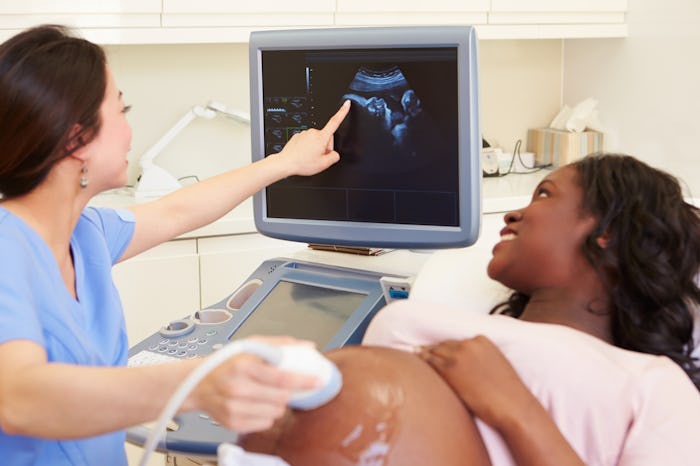As an obsessive planner, the first thing I wanted to know the second I found out I was pregnant was my due date: the day I was going to meet my baby. Of course most women do not give birth on their actual due date, but as I grabbed my copy of "What To Expect When You're Expecting" and flipped to the table of contents, I realized that as important as it is to have a ballpark of your baby's arrival, it's also just as crucial to know my baby's estimated gestational age so that I can make sure that my pregnancy was on the right track.
Because it's nearly impossible to know the exact date of conception (in most cases), the gestational age of your baby is always calculated based on the first day of your last menstrual period (LMP), as is the expected due date. There are two ways to determine your baby's due date. One uses calendars and math math: take the date of your LMP, subtract three months and add seven days plus a year or take the date of your last menstrual period and add 280 days. The second way is by using ultrasound measurements of your growing baby. According to American Pregnancy, the best time to estimate gestational age using ultrasound is between the eighth and 18th weeks of pregnancy, so don't be alarmed if you're sure you're pregnant at five weeks, but the doctor doesn't ask you to come in until your eighth week.
In doing the math calculations based on LMP, you can add in your head, use the cheat-wheel that they have at obstetrician's offices or use an online gestational measurement tool, like the one from the American Pregnancy Association. Ultrasound measurements include taking the size of the gestational sac in millimeters and adding 28 to it to determine how many days you are pregnant. According to BabyMed, this assumes average growth of 1 mm per day, which isn't the case for all babies, but an average. Doctors also use the length from the crown to the rump of the fetus, known as the crown rump length (CRL) to determine age. To do this, you assume one day for every mm in the CRL, then add six weeks. So if you had a CRL of 18mm, you would make that into 18 days or 2 weeks and 4 days, then add it to 6 weeks to get a gestational age of 8 weeks and 4 days.
According to Perinatology, "The American College of Obstetricians and Gynecologists recommends that ultrasound-established dates should take preference over menstrual dates when the discrepancy between ultrasound dating and LMP is:
- Greater than 5 days before 9 weeks of gestation
- Greater than 7 days from 9 weeks to 15 weeks
- Greater than 10 days from 16 weeks to 21 weeks
- Greater than 14 days from 22 weeks to 27 weeks
- Greater than 21 days after 28 weeks."
While ultrasound measurements seems like it should be an exact science, it isn't. Fetuses can grow at different rates and irregular periods can also cause the doctor to be off by a few days or even a week in terms of when he thinks conception may have occurred.
Some doctors will attempt to determine gestational age with a bimanual exam, which is putting two fingers into the vagina and pressing on the cervix while the other hand pushes down on the uterus. According to BabyMed, the doctor feels the size and shape of the uterus and could use this to determine gestational age. This is not the most accurate way to do this, of course. When I was nine weeks pregnant with my daughter, I had my first doctor's appointment and the doctor did a bimanual exam, looked at my LMP and told me that the size of my uterus didn't measure up to a nine week pregnancy. He told me that it was very possible that the pregnancy wasn't viable, but they would send me down the hall for an ultrasound for testing. I waited the longest hour of my life in that waiting room to finally get on the ultrasound table and hear my daughter's heartbeat.
While gestational age is useful for determining when to do certain pre-natal tests and trying to keep track of what you should be expecting throughout the course of your pregnancy, due dates are usually just giant estimates in reality. Babies come early, late and, every once in a while, on time, so always try to prepare yourself for every kind of scenario.
Check out Romper's new video series, Romper's Doula Diaries:
Watch full episodes of Romper's Doula Diaries on Facebook Watch.
